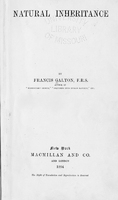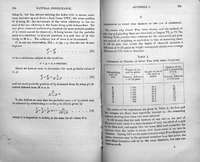Controlling Heredity
Francis Galton: Father of the British Eugenics Movement

Francis Galton (British, 1822 – 1911)
Natural Inheritance.
New York: MacMillan, 1889.
Depository 575.1 G13
University of Missouri Libraries
University of Missouri
Full text in Google Books

Francis Galton (British, 1822 – 1911)
Natural Inheritance.
New York: MacMillan, 1889.
Depository 575.1 G13
University of Missouri Libraries
University of Missouri
Full text in Google Books
Francis Galton was the half-cousin of Charles Darwin and was widely recognized by contemporaries as one of the greatest and most prolific of Victorian-Era polymaths. Galton published in excess of 340 papers and books during his lifetime, and he was the originator of such statistical principles as regression toward the mean and correlation. Above all else Galton was an applied mathematician who attacked problems in all disciplines including human heredity and the human faculties of genius and accomplishment. He used his statistical tools and keen sense of pattern recognition to study which human characteristics were biological and which ones derived from the surrounding environment.
Beyond being a talented statistician, Galton was also an empiricist and an experimentalist. He conducted cross breeding studies in both plants and animals. Galton, like Gregor Mendel, studied inherited traits in plants using garden peas. The conclusions of these plant and animal studies were extrapolated to his analysis of human heredity.
In his most important book on human characteristics and talents, Inquiries into Human Faculty and Its Development, Galton introduced the word “eugenics,” taken from the joining of the Greek words eu (well) and genos (offspring) to become “eugenics” or the science of being wellborn. Galton’s methods of statistical analysis of human and family accomplishment and failures provided the central tool used by American proponents of directed human heredity.
Although written for a general audience, Natural Inheritance was Galton’s most technical and statistically oriented monograph. Quantifying the relative contribution of ancestors to offspring resulted in “Galton’s Law of Hereditary Kinship.” However, the law and the book were widely criticized—even by his staunchest collaborator Karl Pearson—due to the simplistic use of statistical methods.
As Galton got older he backed away from the claims that precision in evaluating eugenic worth was possible with current data and methods. In Galton’s presidential address at the 7th International Congress of Hygiene and Demography held in London in 1891, the word “eugenics” was not used. In the conclusion of his address he said:
…I wish again to emphasize the fact that the improvement of the natural gifts of future generations of the human race is largely, though indirectly, under our control. We may not be able to originate, but we can guide....It is earnestly to be hoped that inquiries will be increasingly directed into historical facts, with the view of estimating the possible effects of reasonable political action in the future, in gradually raising the present miserably low standard of the human race to one in which the Utopias in the dreamland of philanthropists may become practical possibilities.
On display is a “Comparison of Weights of Sweet Peas with their Diameters” and “Experiments on Sweet Peas Bearing on the Law of Regression.”